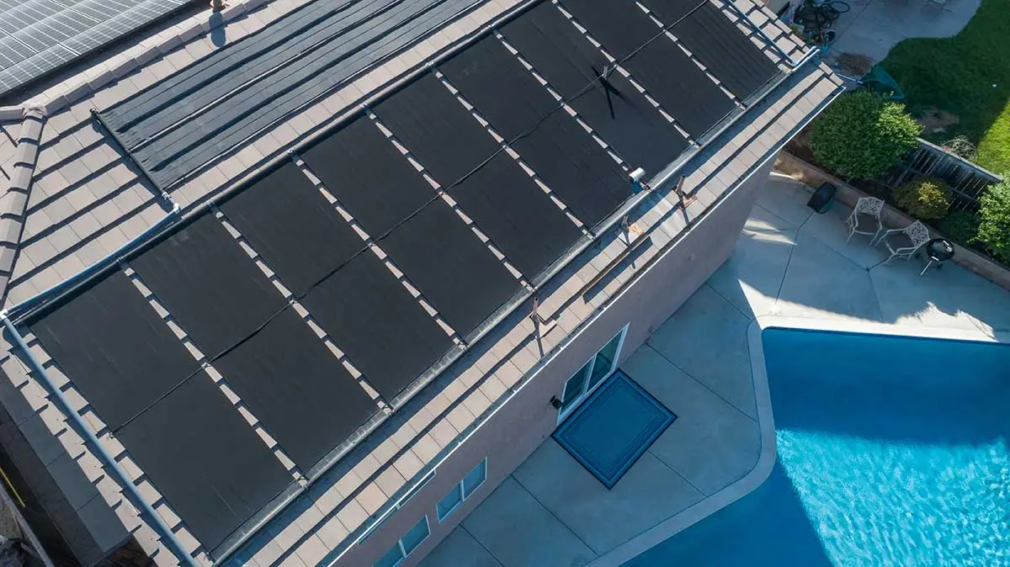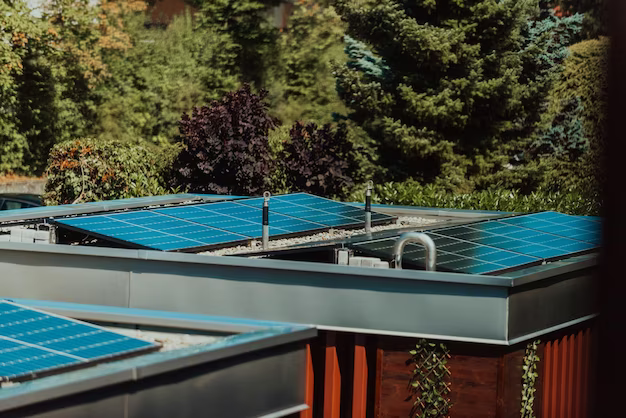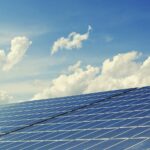Solar Power for Pools: Time and Efficiency Breakdown
Ever thought about ditching conventional pool heaters for solar panels? We’ll delve into how effective they are and answer the question on every pool owner’s mind: just how long does it take to get that water to the perfect temperature?
Solar panels aren’t just for generating electricity. Their eco-friendly prowess extends to heating pools. Here’s why they’ve become a favorite:
- Eco-friendly: They harness the sun’s energy, slashing carbon footprints;
- Cost-effective: After initial setup, say goodbye to those skyrocketing utility bills;
- Low maintenance: Fewer moving parts mean fewer breakdowns.
How Solar Panels Heat Your Pool
Understanding the mechanism can demystify the time it takes. Essentially, water from your pool circulates through solar collectors. These collectors get hot from the sun’s energy. The water gets heated during this process and is then returned to the pool. It’s a cycle that ensures consistent heating.
Factors Affecting Heating Time
Wondering about the timeline? Multiple factors come into play:
- Pool Size: Naturally, larger pools require more time;
- Solar Panel Efficiency: Not all panels are created equal. Higher efficiency panels do the job faster;
- Sunlight Intensity: Bright, direct sunlight boosts the speed;
- Starting Water Temperature: A colder pool at the outset will demand more time;
- Desired Temperature: The hotter you want it, the longer you’ll wait.
Solar Panel Types and Their Efficiency
Picking the right panel can make a huge difference:
| Panel Type | Efficiency | Best For |
|---|---|---|
| Flat Plate Collectors | Moderate | Smaller pools, consistent sunlight |
| Evacuated Tube Collectors | High | Larger pools, variable sunlight |
| Unglazed Solar Collectors | Low | Above-ground pools, mild climates |
Calculating Heating Time: A Rough Estimate
Let’s crunch some numbers, shall we? For a standard-sized pool with efficient panels and good sunlight, expect a temperature rise of about 1°F per hour. Hence, to increase the temperature by 10°F, you might need around 10 hours.
Comparing Solar Heating with Conventional Methods
Solar Panels vs. Gas Heaters:
- Efficiency: Solar panels are more energy-efficient;
- Cost: Solar might have higher upfront costs, but long-term savings are massive with reduced utility bills.
Solar Panels vs. Electric Heaters:
- Efficiency: Electric heaters can heat the pool faster but consume a lot of power;
- Cost: Solar panels emerge victorious with minimal operational costs.
Maintaining Your Solar Pool Heater for Optimum Results
A well-maintained system ensures a quicker heating time. Here’s a quick maintenance checklist:
- Check for any obstructions shading the panels;
- Ensure water flow is unimpeded;
- Clean panels occasionally to maintain efficiency.
The Science Behind Solar Panels
Diving a little deeper, solar panels employ photovoltaic cells. These cells convert sunlight directly into electricity. Here’s a brief breakdown of the process:
- Sunlight Hits the Panel: Photons in sunlight strike the cells, dislodging electrons;
- Electron Movement: These electrons move, creating an electrical current;
- Conversion to Usable Power: The generated direct current (DC) electricity is converted to alternating current (AC) for home use, including pool heating.
Remember, while we mainly focus on heating, these panels also serve as an excellent power source for other household needs!
Solar Panel Positioning: A Crucial Aspect
Where you place your solar panels greatly influences their efficiency. Consider:
- Angle of Installation: Ideally, the angle should match your latitude. For instance, if you’re at 40° latitude, a 40° tilt is optimal;
- Direction: In the U.S., panels should face true south for maximum sunlight exposure;
- Shade Assessment: Avoid placing panels where they might be overshadowed by trees or structures.
| Positioning Factor | Ideal Condition | Impact on Efficiency |
|---|---|---|
| Angle | Equal to Latitude | Optimal Sunlight Absorption |
| Direction | True South | Maximum Daylight Exposure |
| Shade | Minimal | Uninterrupted Power Generation |
Safety and Solar Panels: What You Need to Know
While solar panels are environmentally friendly and cost-effective, safety is paramount. Here are some safety guidelines:
- Installation Safety: Always hire professionals. DIY might sound appealing, but incorrect installations can lead to inefficiencies or hazards;
- Regular Check-ups: Have the system inspected annually to ensure it’s in top shape;
- Weather Warnings: In areas prone to extreme weather, consider protective measures like panel guards.
Expanding Your Solar Setup: Beyond the Pool
If you’ve embraced solar energy for your pool, why not consider its broader applications? Here’s a list of ways you can use solar power:
- Home Electricity: Power your entire home, cutting down on electricity bills;
- Water Heaters: Solar-powered geysers can provide hot water throughout the year;
- Garden Lights: Illuminate your garden pathways and structures using solar lights;
- Charging Stations: Set up solar-powered stations for gadgets like phones and laptops.

Solar Panel Efficiency Over Time
Solar panels, much like any other technological device, undergo wear and tear. Over the years, their efficiency might slightly decline, but not drastically.
Factors Affecting Efficiency Decline
A myriad of elements can influence the rate at which your solar panels degrade. Environmental conditions play a significant role. For instance, if you reside in an area with extreme temperature fluctuations or frequent hailstorms, your panels may experience a faster decline. Additionally, the quality of the solar panel and the technology used in its manufacturing can also determine its longevity and efficiency retention.
Enhancing Longevity and Efficiency
Routine maintenance can slow down the degradation process. Ensure that no debris accumulates on the surface, as this can block sunlight. Regularly checking the connections and ensuring that the inverter is functioning optimally can also prolong the life and efficiency of your panels.
The Economics of Solar Pool Heating
Heating your pool using solar panels is not just about environmental conservation; it’s also a financially savvy move.
Initial Costs vs. Long-term Savings
While the upfront cost of setting up solar panels can be substantial, the long-term savings are undeniable. Over time, the reduction in electricity bills will offset the initial expenses. Moreover, as energy prices soar, having a renewable source of energy protects you from volatile market shifts.
Financial Incentives and Rebates
Governments around the world, recognizing the importance of sustainable energy, often offer incentives for those who opt for solar installations. These can be in the form of tax breaks, rebates, or even direct financial assistance. It’s worth researching local schemes that might make your switch to solar even more economical.
Environmental Impact and Future Trends
Opting for solar energy does more than just reduce your utility bills; it significantly diminishes your carbon footprint.
Solar vs. Traditional Energy Sources
Traditional sources of energy, especially fossil fuels, contribute immensely to global carbon emissions. These emissions are the leading culprits behind global warming and the subsequent climatic changes we’re witnessing. In contrast, solar energy is clean, green, and sustainable.
Emerging Trends in Solar Technology
As the global community becomes more aware of environmental concerns, there’s a concerted push towards cleaner energy sources, with solar leading the charge. Advancements in technology promise even more efficient panels in the future. Innovations in battery storage solutions mean that excess energy generated on sunny days can be stored for use during cloudier periods, ensuring consistent pool temperatures regardless of weather fluctuations.

Decoding the Installation Process
Transitioning to solar-powered pool heating might seem daunting, especially when considering the installation process. However, understanding the step-by-step approach can help ease any apprehensions.
- Site Assessment: Before any installations commence, professionals will assess your property. This involves checking the roof’s strength, determining the optimal angle for the panels, and identifying any potential obstructions;
- Choosing the Right System: Depending on the pool size, location, and the amount of sunlight your area receives, the installation team will recommend the most suitable solar pool heating system;
- Mounting and Installation: Here’s where the action happens. Solar collectors are mounted, either on the roof or on a ground rack. Pipelines are then connected from the pool to these collectors;
- System Testing: Once everything is in place, the system undergoes rigorous testing. This ensures that water circulates correctly and that the panels are absorbing and transmitting heat efficiently.
Beyond Heating: The Versatility of Solar Energy
Solar energy isn’t limited to just heating your pool. Its applications are as vast as the sun’s rays themselves.
| Application | Benefits |
|---|---|
| Home Lighting | Reduction in electricity bills, and eco-friendly illumination. |
| Cooking | Solar cookers provide a clean method, reducing dependence on gas or electricity. |
| Desalination | Solar energy can power systems that turn saltwater into fresh, potable water. |
| Ventilation | Solar-powered attic fans can help reduce the strain on your home’s cooling system. |
User Testimonials: Hearing it from the Horse’s Mouth
There’s no better way to gauge the efficacy of a product than by hearing from those who’ve used it. Here’s what some solar pool heating system owners had to say:
- Alex from California: “Transitioning to solar has been one of the best decisions for our home. Not only is our pool always ready for a dip, but our energy bills have seen a significant drop!”;
- Melinda from Arizona: “I was initially skeptical about how well the solar heater would work, especially in winters. But it’s been a pleasant surprise. Plus, the added advantage of contributing to a cleaner environment feels great.”;
- Ron from Nevada: “The upfront costs had me second-guessing my decision, but the long-term savings and consistent pool temperature year-round have made it all worth it.”
Conclusion
Is Solar Pool Heating Right for You? With the sun as a natural resource, solar panel heating is efficient, cost-effective, and eco-friendly. The initial setup might be a bit pricey, but the long-term savings are undeniable. So, if you’re asking, “How long does it take to heat a pool with solar panels?” the answer varies. But with patience and the right setup, you’ll be diving into warm waters in no time.
Frequently Asked Questions
Solar heaters are most effective in sunny regions, but they can be optimized for cloudier climates with the right setup.
Direct sunlight enhances efficiency, but they can work with diffused sunlight, albeit at a reduced efficiency.
While initial costs are high, over a few years, you might see up to a 50% reduction in energy bills.
In milder winters, yes. However, in harsher climates, they might not be as effective.
With proper maintenance, they can last 15-20 years.









